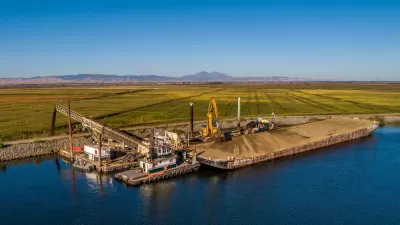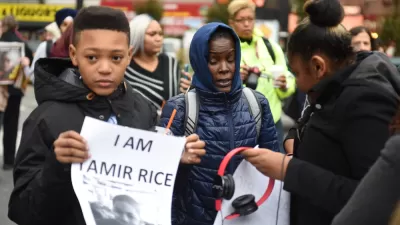Being a person of color in the United States means being physically vulnerable to both environmental hazards and police violence, two professors argue.
UC Davis professors are exploring the connections between police killings of black Americans and toxic environmental conditions. In a forthcoming article, they argue that "place and environment matters when discussing police violence," reports Brentin Mock in CityLab.
Environmental hazards are overly concentrated in communities of color, where police violence has also been persistently protested.
The authors propose understanding U.S. racism as "an embodied experience of structural, environmental insecurity." Professor Lindsey Dillon adds:
"Toxic exposure is also a form of slow violence and slow death… For many people, the lived experience of police violence and toxic exposure—these different forms of physical vulnerability both live together. We have to think of them together instead of thinking of them separately."
Mock offers context in anticipation of the article, touching on the police killings of Freddie Gray in Baltimore (where he, like Korryn Gaines, struggled with lead poisoning) and Eric Garner in New York (who suffered from asthma, a condition whose distribution is racialized across New York and the U.S.), among others.
FULL STORY: How Environmental Injustice Connects to Police Violence

Planetizen Federal Action Tracker
A weekly monitor of how Trump’s orders and actions are impacting planners and planning in America.

Restaurant Patios Were a Pandemic Win — Why Were They so Hard to Keep?
Social distancing requirements and changes in travel patterns prompted cities to pilot new uses for street and sidewalk space. Then it got complicated.

Maui's Vacation Rental Debate Turns Ugly
Verbal attacks, misinformation campaigns and fistfights plague a high-stakes debate to convert thousands of vacation rentals into long-term housing.

In California Battle of Housing vs. Environment, Housing Just Won
A new state law significantly limits the power of CEQA, an environmental review law that served as a powerful tool for blocking new development.

Boulder Eliminates Parking Minimums Citywide
Officials estimate the cost of building a single underground parking space at up to $100,000.

Orange County, Florida Adopts Largest US “Sprawl Repair” Code
The ‘Orange Code’ seeks to rectify decades of sprawl-inducing, car-oriented development.
Urban Design for Planners 1: Software Tools
This six-course series explores essential urban design concepts using open source software and equips planners with the tools they need to participate fully in the urban design process.
Planning for Universal Design
Learn the tools for implementing Universal Design in planning regulations.
Heyer Gruel & Associates PA
JM Goldson LLC
Custer County Colorado
City of Camden Redevelopment Agency
City of Astoria
Transportation Research & Education Center (TREC) at Portland State University
Jefferson Parish Government
Camden Redevelopment Agency
City of Claremont





























